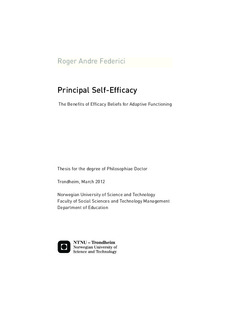Principal Self-Efficacy: The Benefits of Efficacy Beliefs for Adaptive Functioning
Doctoral thesis
Permanent lenke
http://hdl.handle.net/11250/269577Utgivelsesdato
2012Metadata
Vis full innførselSamlinger
Sammendrag
One purpose of the present thesis was to develop and test the factor structure of a multidimensional and hierarchical Norwegian Principal Self-efficacy Scale. The scale was designed to capture principals’ self-efficacy in relation to different areas of responsibilities and relations. The development of the instrument was initiated with qualitative interviews with principals from different schools. Eight categories were derived from the interviews and a questionnaire was developed on the basis of these categories. Another purpose of the research was to investigate relations between principals’ self-efficacy and other work related psychological concepts and perceived contextual conditions. The research was conducted in two phases, a pilot and a main study. Participants in the pilot study were 300 principals of the population of Norwegian principals. Participants in the main study were 1818 principals from the same population. Data were collected by means of electronic questionnaires and analyzed be means of confirmatory factor analyses and structural equation modeling. The results clearly support the conceptualization of principal self-efficacy as a hierarchical and multidimensional construct. Moreover, the findings supported expectations that were derived from self-efficacy theory and previous research indicating that perceived self-efficacy influences individual’ cognitions and emotions, and determines how environmental opportunities and impediments are perceived.
Består av
Federici, R. A.; Skaalvik, E. M.. Principal self-efficacy: Relations with burnout, job satisfaction and motivation to quit. , 2012. 10.1007/s11218-012-9183-5.Federici, Roger Andre. Principals’ self-efficacy. European Journal of Psychology of Education. (ISSN 0256-2928), 2012. 10.1007/s10212-011-0102-5.
Federici, R. A.; Skaalvik, E. M.. Teacher and principal self-efficacy: Relations with autonomy and emotional exhaustion. Self-Efficacy in School and Community Settings, 2012.
